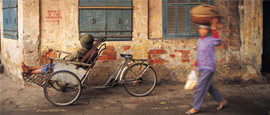Hanoi History
For many years, Vietnam formed part of the French colony of Indochina, along with Cambodia and Laos. In 1941, the Japanese occupied Vietnam during their WWII sweep through South East Asia. The resistance to the Japanese was led by the Indochinese Communist Party.
Communist revolutionary Ho Chi Minh established the Viet Minh during WWII to gain independence from France. Fighting continued until 1954 when the French surrendered to the Viet Minh at Dien Bien Phu and Hanoi became the capital of North Vietnam. But Ho Chi Minh was determined to reunite the whole country.
The USA came to the support of South Vietnam, and full-scale war broke out in 1965. The Americans withdrew in 1973, and fighting continued until 1975 when Saigon fell to North Vietnamese troops. Vietnam was reunited under Hanoi and communist rule the following year.
For many years after the war, Hanoi had a reputation as an austere city, unwelcoming to visitors. Life was hard for the residents as the city and country rebuilt itself. Hanoi had been continuously bombed by the Americans throughout the Vietnam War, but with the lifting of the American trade embargo in 1994 and the reinstatement of diplomatic relations the following year, Hanoi cautiously embraced economic reform, helped by the instinctive entrepreneurism of its residents.
All damage has long since been repaired, and now the elegance of the old colonial buildings and the mish-mash of the narrow streets in the Old Quarter sit easily with more modern additions.
Celebrations took place in October 2010 to mark 1,000 years since the city was founded by King Ly Thai To. Hanoi was flooded with spectators to watch a huge parade including the military, marching bands and colourful dragon dancers. The confidence of the celebrations showed out Hanoi is once more resurgent as a powerful player in the Asian scene.
Did you know?
• Hanoi became home to the world’s largest ceramic mosaic in 2010 with a piece of artwork along the Red River Road stretching for 3,850m (12,631 ft).
• Vietnamese Communist leader, Ho Chi Minh, wanted to be cremated. Instead his body is embalmed in Hanoi’s Ho Chi Minh Mausoleum, which is modelled on Lenin’s Tomb.
• John McCain, who ran in the 2008 United States presidential election, was one of the prisoners of war held at Hỏa Lò Prison the Vietnam War.
Do you have any Feedback about this page?
© 2025 Columbus Travel Media Ltd. All rights reserved. No part of this site may be reproduced without our written permission, click here for information on Columbus Content Solutions.




 You know where
You know where